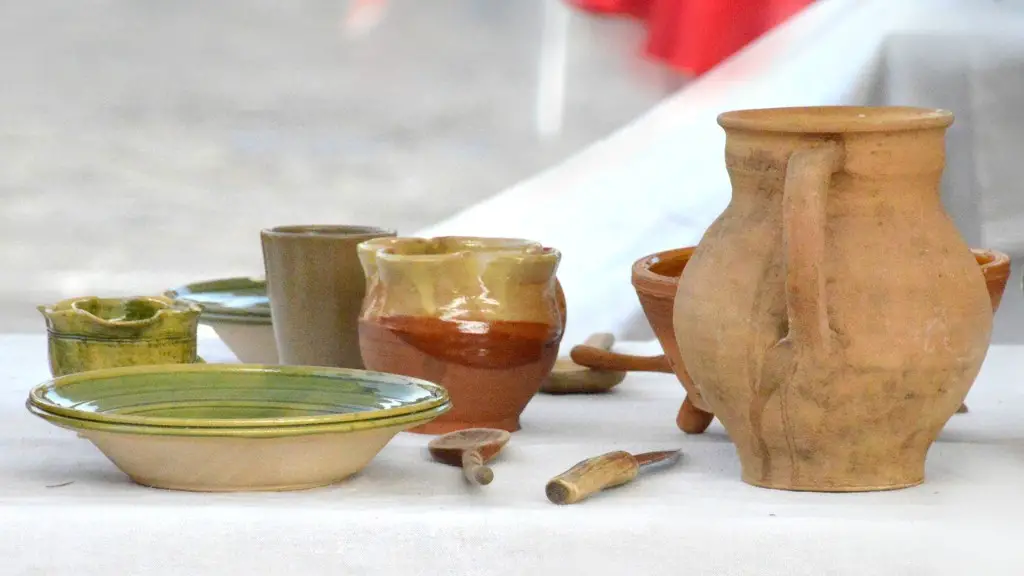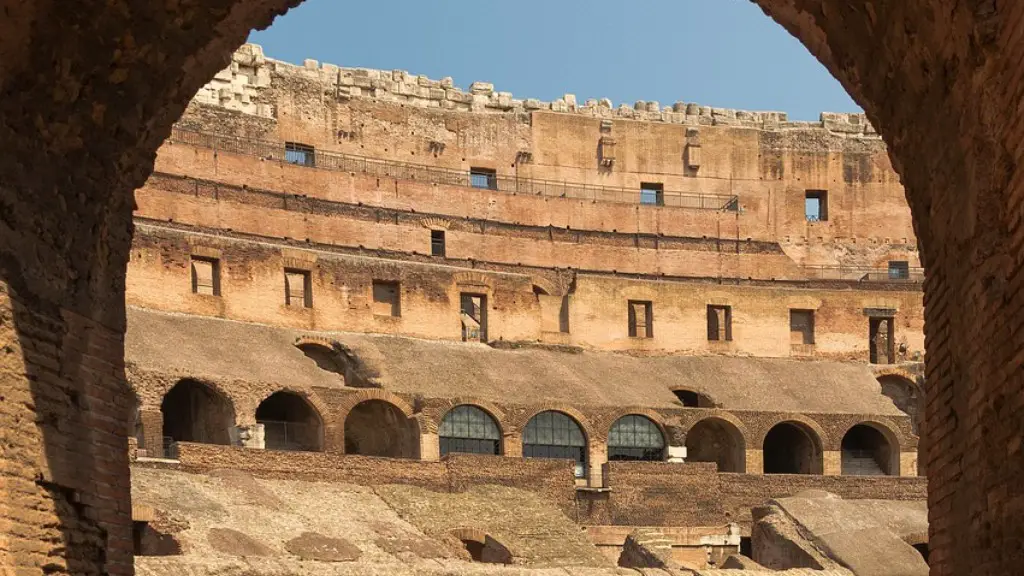Ancient Rome was an influential and powerful empire in the Mediterranean world that existed from the 8th century BC to the 5th century AD. It was renowned for its unique political system and its engineering feats, but the most powerful and enduring legacy is its religious system. For centuries, the Roman people were mostly polytheistic, worshipping a variety of gods, goddesses, and supernatural forces. The most prominent of these deities was Jupiter, the highest ranking god, who was worshipped throughout the ancient world. The ancient Roman religion was based on traditions, beliefs and rituals, and it was closely intertwined with the state and its laws. Although it changed and evolved over time, the core elements of the religion remained the same.
The most common religion in ancient Rome was the traditional polytheistic religion, which was passed down through generations and was the cornerstone of Roman culture and society. This system was based on a pantheon of gods and goddesses, who represented various aspects of the human experience and were interwoven into the fabric of daily life. The most important of these gods was Jupiter, the chief deity, followed by his wife Juno and the goddess Minerva. Other gods were Mars, the god of war, Venus, the goddess of love, and Apollo, the god of the sun.
The Romans believed that these gods and goddesses had the power to control the fate of humans and shape their lives. They also believed that their gods could bring them prosperity and luck. To honour these gods and goddesses, the Romans engaged in elaborate rituals, such as sacrifices and prayers, to propitiate them.
The Romans also believed in spirits and supernatural forces, and there was a great deal of superstition among the people, who sought out soothsayers and diviners to predict the future. The Romans believed in the afterlife, and they practised certain funeral rites to ensure that the spirits of the dead were appeased.
Despite all these beliefs and practices, ancient Rome was also a cosmopolitan society, and many different religious beliefs and practices were tolerated and in some cases even embraced. Judaism was practised in the Roman Empire and there were many different mystery cults, such as the cult of Dionysus and the cult of Isis. Christianity first appeared in the Roman Empire in the first century AD, and over time it became the dominant religion in the Empire and eventually replaced polytheism.
The impact of the ancient Roman religion is still seen today. The various gods, myths and rituals of the religion have been adopted in many different cultures and are still being practised in some countries. The legacy of ancient Rome and its religion remain as a reminder of its powerful legacy of faith and religiosity.
Political Influence
The ancient Roman religion was not simply a matter of faith, but also a political force to be reckoned with. In its heyday, the Roman Senate had the authority to introduce new state-approved religious practices and activities. This political influence over the faith was exercised through the college of pontiffs, who were responsible for interpreting and enforcing the rituals and laws of the state-run religion.
The Roman government also regulated the use of religious symbols. They were used to denote authority and to mark the boundaries of Rome’s many sanctuaries and temples. The government also encouraged certain religious activities, such as the celebration of the Roman festivals, to promote unity and stability within the empire.
The ancient Romans also elevated their gods and goddesses to a level of reverence and importance. They built grand temples and monuments to their gods and goddesses, and made sacrifices to them in public ceremonies. They also organized religious games and events that involved competitions such as chariot races and boxing matches.
Philosophical Views
The beliefs and practices of the ancient Roman religion had a strong philosophical component. The Romans believed that the gods and goddesses of their pantheon were intimately connected to the natural world and had influence over the ultimate outcome of events. This belief gave rise to a range of philosophical views and theories, including Stoicism and Epicurianism.
Stoicism was a philosophical school that argued that one should strive to achieve a life of virtue and contentment through accepting one’s fate without struggling against it. Epicurianism was a school of thought that argued for a life of pleasure, where one should pursue the simple pleasures of life and avoid overindulgence.
These two schools of thought shaped the way the ancient Romans thought about their religion and its implications for their lives. It also influenced their political views and the ways in which they understood and interacted with the world.
Religious Rituals
The ancient Roman religion was a complex system of rituals and ceremonies. The most important ritual was the festival of Saturnalia, which marked the winter solstice and the longest night of the year. It was a time of celebration and joy, with festivities that included singing, dancing, feasting and gift-giving.
Other rituals included animal sacrifices and offerings to honour the gods and goddesses. On special occasions, the Romans would also hold processions, theatrical and sporting competitions and even gladiatorial contests in honour of the gods.
The ancient Romans also believed in prayer and ritualised practices such as divination and astrology. They consulted soothsayers, oracles and other prophets in an effort to divine their fate. They also relied on religious experts to interpret the will of their gods and goddesses and provide guidance.
Influence on Modern Society
The ancient Roman religion had an immense influence on modern society. For example, many modern religions, such as Christianity, are based on the beliefs, practices and concepts of the ancient Roman religion.
The Roman pantheon of gods and goddesses is also reflected in popular culture. Symbols such as the thunderbolt of Zeus, the crescent of Selene, and the trident of Poseidon, are easily recognisable and used in art and literature. The stories of the gods and goddesses of ancient Rome have been handed down over the centuries and continue to be a subject of fascination and inspiration.
The impact of the ancient Roman religion is far-reaching and its legacy can still be felt today. It reminds us of the power of faith, the importance of ceremony and ritual, and the need to live in harmony with each other and with nature.
Common Practices
The ancient Roman religion was an amalgamation of many different beliefs, rituals and practices. At its core, the religion was polytheistic, with a pantheon of gods and goddesses that reflected the Roman world-view and culture.
Prayer and offerings were central to the ancient Roman religion, and the people regularly made prayers, and offered sacrifices, to propitiate the gods and goddesses in order to obtain their favour and prevent bad luck. They also believed in the power of amulets and charms, and often wore these as protection from evil forces.
Divination and astrology were also important aspects of the religion, as the Romans believed that the intervention of gods and goddesses, spirits and supernatural forces could be seen in the stars and in the patterns of nature. The people relied on an array of religious experts, such as oracles and soothsayers, to interpret the will of their gods and provide guidance.
Influence of Christianity
Christianity first appeared in the Roman Empire in the 1st century AD and it gradually displaced the traditional polytheistic religion. As Christianity grew in popularity, the Roman emperors began to adopt the new faith, and by the 4th century AD, it had become the official religion of the empire.
Christianity brought a distinct set of beliefs and values that were markedly different from the pagan beliefs of the ancient Roman religion. It emphasised monotheism, the belief in the divine power of a single God, and taught that all people have a duty to obey God’s will. It also offered a more universal and inclusive worldview, emphasising social justice, mercy, and compassion.
Despite the dominance of Christianity, the impact of the ancient Roman religion can still be felt today. Modern religious rituals, such as prayer and offerings, are derived from the practices of the ancient Roman religion, and the stories and myths of the gods and goddesses continue to resonate with people today.
Conclusion
The most common religion in ancient Rome was traditional polytheism which was widely practised throughout the Empire. This faith had many aspects and was interwoven into the daily lives of the Romans. The religion was also heavily politicised, with the Roman government using it to exercise control over its citizens. Philosophically, this religion gave rise to various schools of thought, such as Stoicism and Epicurianism, which are still relevant today. It also had an array of rituals, including sacrifices and offerings, which the Romans used to honour their gods and goddesses.
Though polytheism was supplanted by Christianity in the 4th century AD, it still influences modern society. The gods and goddesses of the Roman pantheon remain part of popular culture and the stories, myths and religious practices of the ancient religion continue to be relevant to this day.


